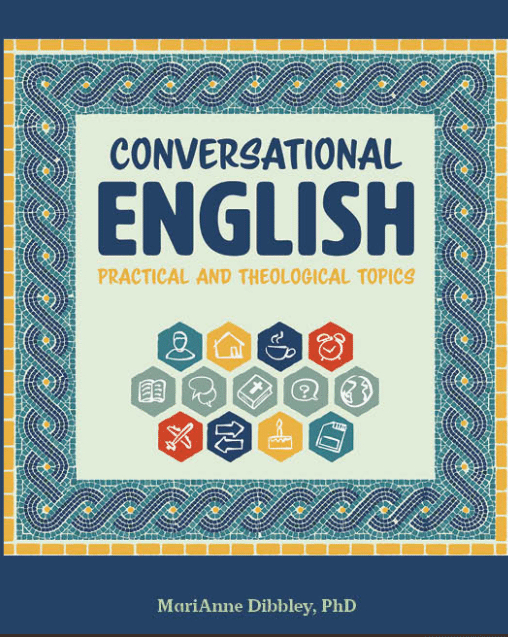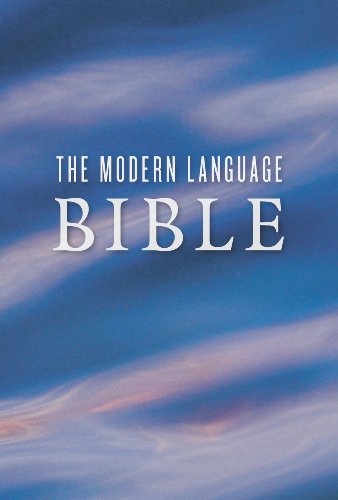
8 Ways to Learn English with the Bible
Have you ever tried to read an English Bible?
If so, you may have wondered why it has so many strange old English words that nobody uses—words like “ye,” “thy,” “thine” and “hath.”
For people who speak English as a second language, the old-fashioned style of English found in the popular King James Version of the Bible can be really confusing. After all, it was translated in 1604!
Luckily, there are many more modern versions of the Bible that use everyday English without all the old fashioned words.
As a result, the Bible has now become a great tool for learning English, just as useful as your favorite novels.
In this post, I’ll go over eight excellent resources for learning English with the Bible, plus an extensive vocabulary list of essential Bible vocabulary.
Contents
- Helpful Bible Resources for English Learners
- Vocabulary Words You’ll See Often in the Bible
- Why Learn English with the Bible?
Download: This blog post is available as a convenient and portable PDF that you can take anywhere. Click here to get a copy. (Download)
Helpful Bible Resources for English Learners
The Bible and English
Level: All skill levels

The Bible and English is an excellent resource for beginners who want to improve their English while learning more about the Bible. Most Bible resources created for English language learners are designed to help make Bible verses easier to understand. The Bible and English, on the other hand, is unique in that it turns the Bible into a way of learning English.
The Bible and English offers a variety of free and paid content to help you practice English while studying the Bible. The website offers listening and pronunciation exercises, as well as the following “premium” activities:
Since The Bible and English acts as curriculum (a learning plan), the lessons come with grammar exercises as well as activities to build vocabulary. Additionally, they’ve just released an excellent new book: “Conversational English: Practical and Theological Topics.”
Jesus Film Project
Level: All skill levels

The Jesus Film Project website includes a full-length feature film on the life of Jesus. The movie is perfect for students who want to practice their English listening skills while learning more about the story and teachings of Jesus Christ. And since it comes with English subtitles, the movie is a great learning tool for low-level learners, as well as intermediate and advanced students.
Along with the movie, the Jesus Film Project website also has an active blog where you can read more about Jesus and stories from the Bible. You can also download their app for your iOS or Android device to learn more about Jesus and other Biblical figures in English.
“EasyEnglish Bible”
Level: Beginner to intermediate

“EasyEnglish Bible” is a free online Bible designed to give the international community easy access to the Bible in English. Created specifically for people who speak English as their second language, the “EasyEnglish Bible” uses simplified English that doesn’t require an advanced vocabulary to fully understand.
The “EasyEnglish Bible” is great for anyone looking to build their English vocabulary while reading Bible verses. It comes with all of the books of the Bible, as well as a number of other useful resources to help make studying the Bible easier. Some of these extra features include audio clips from the Book of Ruth and John’s Gospel and a quick summary of each book in the Bible.
And if you’re still learning English at the beginner level, you should take a look at their popular Bible stories section. Here, you can read about people like Noah, Moses and Jesus in English that’s simple and easier to understand.
BTstories
Level: Beginner to upper-intermediate

BTstories lets you read Bible stories in simple, easy-to-understand English. Here, you can read about everything from the creation story all the way up to Jesus and his disciples. All of the stories are written in a way that’s easy for English language learners to follow. Also, most stories come with extra resources—like pictures, background information and videos—that will help improve your understanding of each tale.
For example, the story of Abraham comes with two videos, a map of the area and even additional resources where you can read further. Also, if you click the “Hear the Story Told” button under each story on the right-hand side, you can listen to the story being read by a native English speaker.
This makes BTstories a good resource to use for reading and listening practice.
TalkEnglish
Level: Beginner to upper-intermediate

TalkEnglish is a language learning website that helps students learn English through worksheets and stories based on the Bible.
Here, students can work with an instructor who’s able to help them practice…
- Pronunciation
- Grammar
- Vocabulary
- Writing and conversational skills
TalkEnglish offers two different English study programs, known as Level 1 and Level 2. The first level focuses mostly on learning the basics of English through Bible stories, while Level 2 is better suited to intermediate students who wish to improve their reading, writing and conversational skills.
To learn more about what’s included, take a look at the Level 1 and Level 2 sample lessons.
What’s really awesome about TalkEnglish is that you’re able to participate in actual English lessons for free. While TalkEnglish does accept donations, they don’t charge a fee to enroll in (sign up for) their language learning courses.
To register, all you need to do is click the “Practice English” button on the left-hand side and then select the “Student Registration” button.
“The Bible in Basic English”
Level: Upper-intermediate to advanced

If you’re looking for a way to better understand Bible verses without having to look up outdated Bible terms like “thou shalt,” then Bible Study Tools’ “The Bible in Basic English” is the perfect resource for you.
“The Bible in Basic English” is perfect for any English language learner who’s interested in learning the history and context of each Bible story. The online Bible has all of the verses from the Old and New Testaments, and is written in present-day English, making it easier to understand.
In addition to Bible verses, “The Bible in Basic English” also comes with summaries, background information and educational videos on various books of the Bible. This makes it great for anyone looking to study the Bible as part of their education.
“The Modern Language Bible”
 Level: Upper-intermediate to advanced
Level: Upper-intermediate to advanced
“The Modern Language Bible” was designed for English speakers who don’t feel like looking up definitions of old words and phrases that don’t exist in present-day English.
Reading “The Modern Language Bible” feels less like reading a traditional Bible and more like reading a regular novel. The Bible presents stories in a modern context, while avoiding outdated grammar and expressions. For this reason, “The Modern Language Bible” is perfect for any upper-intermediate or more advanced English language learner who wants to improve their reading and vocabulary while studying Bible verses.
Southern Ontario Cooperative of ESL Ministries

Level: Upper-intermediate to advanced
The Southern Ontario Cooperative of ESL Ministries website is a resource list for ESL teachers who use the Bible to teach English. While some of the content on the site is best suited to teachers, they have a bunch of helpful material for English language learners as well.
Check out their extensive collection of helpful learning resources.
Vocabulary Words You’ll See Often in the Bible
There are certain vocabulary words that people often associate with the Bible. Here’s a list of the most essential Bible vocabulary:
- God — The supreme being creator of the universe in Christianity
- Lord — A title for someone in a position of authority or power, often used to refer to God
- Jesus — The central figure of Christianity, believed to be the Son of God and the savior of humanity
- Spirit — Often used to refer to the Holy Spirit, the third person of the Christian Trinity, or a spiritual essence or presence
- Faith — Complete trust or confidence in someone or something, especially in a religious context
- Love — An intense feeling of deep affection and care for someone or something
- Sin — An immoral act or wrongdoing, often considered as a transgression against divine law (religious law)
- Salvation — Deliverance (freedom) from sin and its consequences, often seen as a spiritual redemption or rescue
- Grace — The free and unmerited favor of God, often manifested as divine assistance or goodwill
- Mercy — Compassion or forgiveness shown towards someone whom it is within one’s power to punish or harm
- Kingdom — A realm or domain where a monarch rules, often used in a religious context to refer to the realm of God’s rule
- Heaven — A place or state of eternal happiness and bliss, often associated with the afterlife in many religious beliefs
- Earth — The planet on which we live, or the physical world and its inhabitants
- Holy — Regarded as sacred and spiritually pure
- Righteousness — The quality of being morally right or justifiable
- Sinful — Characterized by or involved in sin
- Repentance — Sincere regret or remorse for wrongdoing, often accompanied by a commitment to change one’s behavior
- Covenant — A formal and binding agreement, often used in a religious context to refer to a pact between God and humans
- Israel — A nation and people often associated with the descendants of Abraham in the Bible
- Jerusalem — A city of great religious significance in Judaism, Christianity and Islam, and a central location in many biblical events
- Temple — A place of worship, especially in certain religious traditions like Judaism
- Prophet — A person believed to have a special connection with the divine and the ability to communicate messages or revelations from God
- King — A male monarch, a ruler of a kingdom
- Faithful — Full of faith or loyal and steadfast in one’s beliefs or commitments
- Worship — The act of showing reverence and devotion to a deity or religious figure
- Praise — The expression of approval, admiration or worship.
- Blessing — A prayer or act of declaring or invoking divine favor upon someone
- Curse — The act of invoking harm or misfortune upon someone or something
- Hope — A feeling of expectation and desire for a certain thing to happen
- Grace — The free and unmerited favor of God, often manifested as divine assistance or goodwill
- Glory — High renown or honor, often associated with divine radiance or splendor
- Truth — The quality or state of being in accordance with fact or reality
- Light — The natural agent that stimulates sight and makes things visible
- Darkness — The absence of light, often used metaphorically to refer to ignorance or evil
- Life — The quality that distinguishes living things from non-living things
- Death — The permanent cessation (stop) of all vital functions in a living organism
- Resurrection — The act of rising from the dead or being brought back to life
- Redemption — The action of saving or being saved, especially from sin, error or evil
- Atonement — The reconciliation of God and humans through Jesus Christ, often associated with the forgiveness of sins
- Repentance — Sincere regret or remorse for wrongdoing, often accompanied by a commitment to change one’s behavior
- Forgiveness — The act of pardoning or excusing a wrongdoing, often associated with showing mercy and compassion
- Wisdom — The ability to make sound decisions and judgments based on knowledge and experience.
- Knowledge — The understanding, awareness, and information acquired through experience, education or study
- Ye — An archaic or poetic form of “you,” used to address a group of people
- Thy — An archaic or poetic form of “your,” used to show possession
- Thine — An archaic or poetic form of “yours,” used to show possession
- Hath — An archaic or poetic form of “has” or “have”
Why Learn English with the Bible?
Learning English with the Bible is a great way to brush up on your reading and vocabulary skills. If you’ve already read the Bible in your first language, then you probably have a good idea of what each story is about. This could make it easier for you to understand the same stories in English, which can aid you in learning new vocabulary more quickly.
The Bible is also a great authentic resource that you can use along with other authentic resources, like the videos on FluentU.
FluentU takes authentic videos—like music videos, movie trailers, news and inspiring talks—and turns them into personalized language learning lessons.
You can try FluentU for free for 2 weeks. Check out the website or download the iOS app or Android app.
P.S. Click here to take advantage of our current sale! (Expires at the end of this month.)

You might also want to learn English with the Bible for religious reasons. Maybe you want to study at an English-speaking seminary or join a missionary group with mostly English speakers. Whatever your reasons for reading the Bible in English, we have a number of resources to help you better understand Bible verses while you also improve your English skills.
Now that Bibles using modern English are becoming more popular than the traditional King James Version, there are a number of Bible-related resources online that are perfect for English language learners.
This makes the scripture a useful English learning tool.
It’s a great way for anyone to build vocabulary, brush up on their reading skills and improve their level of English.
Download: This blog post is available as a convenient and portable PDF that you can take anywhere. Click here to get a copy. (Download)








